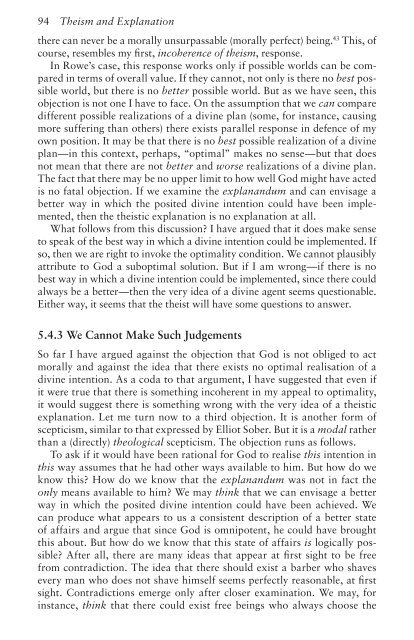Theism and Explanation - Appeared-to-Blogly
Theism and Explanation - Appeared-to-Blogly
Theism and Explanation - Appeared-to-Blogly
Create successful ePaper yourself
Turn your PDF publications into a flip-book with our unique Google optimized e-Paper software.
94 <strong>Theism</strong> <strong>and</strong> <strong>Explanation</strong><br />
there can never be a morally unsurpassable (morally perfect) being. 43 This, of<br />
course, resembles my fi rst, incoherence of theism, response.<br />
In Rowe’s case, this response works only if possible worlds can be compared<br />
in terms of overall value. If they cannot, not only is there no best possible<br />
world, but there is no better possible world. But as we have seen, this<br />
objection is not one I have <strong>to</strong> face. On the assumption that we can compare<br />
different possible realizations of a divine plan (some, for instance, causing<br />
more suffering than others) there exists parallel response in defence of my<br />
own position. It may be that there is no best possible realization of a divine<br />
plan—in this context, perhaps, “optimal” makes no sense—but that does<br />
not mean that there are not better <strong>and</strong> worse realizations of a divine plan.<br />
The fact that there may be no upper limit <strong>to</strong> how well God might have acted<br />
is no fatal objection. If we examine the explan<strong>and</strong>um <strong>and</strong> can envisage a<br />
better way in which the posited divine intention could have been implemented,<br />
then the theistic explanation is no explanation at all.<br />
What follows from this discussion? I have argued that it does make sense<br />
<strong>to</strong> speak of the best way in which a divine intention could be implemented. If<br />
so, then we are right <strong>to</strong> invoke the optimality condition. We cannot plausibly<br />
attribute <strong>to</strong> God a suboptimal solution. But if I am wrong—if there is no<br />
best way in which a divine intention could be implemented, since there could<br />
always be a better—then the very idea of a divine agent seems questionable.<br />
Either way, it seems that the theist will have some questions <strong>to</strong> answer.<br />
5.4.3 We Cannot Make Such Judgements<br />
So far I have argued against the objection that God is not obliged <strong>to</strong> act<br />
morally <strong>and</strong> against the idea that there exists no optimal realisation of a<br />
divine intention. As a coda <strong>to</strong> that argument, I have suggested that even if<br />
it were true that there is something incoherent in my appeal <strong>to</strong> optimality,<br />
it would suggest there is something wrong with the very idea of a theistic<br />
explanation. Let me turn now <strong>to</strong> a third objection. It is another form of<br />
scepticism, similar <strong>to</strong> that expressed by Elliot Sober. But it is a modal rather<br />
than a (directly) theological scepticism. The objection runs as follows.<br />
To ask if it would have been rational for God <strong>to</strong> realise this intention in<br />
this way assumes that he had other ways available <strong>to</strong> him. But how do we<br />
know this? How do we know that the explan<strong>and</strong>um was not in fact the<br />
only means available <strong>to</strong> him? We may think that we can envisage a better<br />
way in which the posited divine intention could have been achieved. We<br />
can produce what appears <strong>to</strong> us a consistent description of a better state<br />
of affairs <strong>and</strong> argue that since God is omnipotent, he could have brought<br />
this about. But how do we know that this state of affairs is logically possible?<br />
After all, there are many ideas that appear at fi rst sight <strong>to</strong> be free<br />
from contradiction. The idea that there should exist a barber who shaves<br />
every man who does not shave himself seems perfectly reasonable, at fi rst<br />
sight. Contradictions emerge only after closer examination. We may, for<br />
instance, think that there could exist free beings who always choose the



